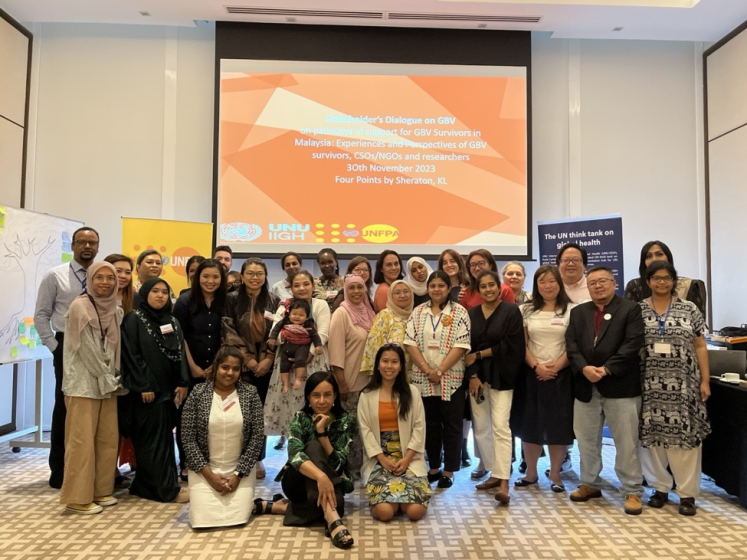In November 2023, the UNU-IIGH and UNFPA convened a stakeholder dialogue in Kuala Lumpur focused on addressing Gender-Based Violence (GBV) in Malaysia. This meeting brought together a diverse group of stakeholders, including representatives from various Civil Society Organizations (CSOs), researchers, doctors, lawyers and UN bodies. The presence of CSOs representatives from different ethnic, religious and gender backgrounds enriched the discussion and our understanding of the complexity of GBV. This inclusivity extended to engaging with CSOs from varied settings, including those from Sabah and Sarawak, as well as communities of refugees, migrants, and transgender individuals. By integrating survivors’ voices, our approach was deliberately designed to be inclusive, reflective of diverse experiences and survivor-centric.
Recognizing the power dynamics and historical contexts that shape the discourse on gender violence, the dialogue aimed to amplify local voices and solutions. This approach challenged the often top-down, one-size-fits-all strategies that overlook the unique cultural, social, and economic fabrics of communities. By centering the experiences and expertise of local CSOs and survivors, the dialogue paved the way for more culturally sensitive, sustainable, and impactful interventions against GBV. The participatory action research methodology employed during the dialogue facilitated a collaborative and inclusive environment. This approach allowed the participants to collectively identify, analyze, and propose solutions to the challenges encountered in accessing support services. By grounding discussions in the lived experiences of GBV survivors, the methodology ensured authenticity and relevance. It also promoted a sense of ownership and empowerment among participants, emphasizing the crucial role of community-led initiatives in combating GBV.
The participatory action research method, with its emphasis on collaboration, reflexivity, and action, fostered a dynamic exchange of ideas, experiences, and best practices, enabling stakeholders to co-create a roadmap for enhancing the One Stop Crisis Centers (OSCC) effectiveness and accessibility. The participants highlighted the importance of continuous engagement, learning, and adaptation in the quest to support GBV survivors more effectively.
A pivotal session during the dialogue involved the presentation and validation of personas and pathways representing diverse GBV survivors who had accessed the services through OSCC. A persona is an evidence-based representation of a particular group, illustrating their attributes, circumstances, behaviour, and beliefs. A journey provides an overview of the experiences, challenges, and opportunities that these personas encounter as they navigate a specific process. The personas and journeys were meticulously developed through case studies and in-depth interviews with GBV survivors, CSO representatives and medical social workers at OSCC. They provided a vivid snapshot of the barriers, gaps, and hopes experienced by individuals navigating the aftermath of GBV. The validation of these personas by participants underscored the critical need for services that are not only accessible and effective but also empathetic and responsive to the varied realities and backgrounds of survivors.
The participants identified key obstacles, particularly in the implementation of programmes and policies related to OSCCs. A major challenge lies in the entrenched patriarchal and gender norms that perpetuate violence and hinder those seeking support, underscoring the complex interplay of social constructs affecting OSCC operations. Following the discussion, the participants delineated a series of actionable strategies to overcome these barriers. Our methodology encompassed both immediate and long-term interventions, tailored to address the multifaceted nature of the challenges identified. The meeting concluded with a joint call for action. (See meeting report HERE). This document is live while we are seeking feedback from CSOs and other stakeholders.
During the dialogue, we gained a nuanced understanding of the complex challenges faced by CSOs in Malaysia. Their dedication and resilience are key to building an effective network of CSOs, to ensure that survivors have access to the resources, support, and justice creating and sustaining responsive service mechanisms.
In conclusion, the Stakeholders’ Dialogue illuminated the path forward to improve the GBV response in Malaysia through an inclusive and participatory approach. By validating the nuanced experiences of GBV survivors and leveraging the local knowledge and expertise of CSOs, the dialogue established a strong foundation for developing more compassionate, contextually relevant, and effective support systems for all GBV survivors. The findings and suggestions from the meeting were integrated into the research study by UNU-IIGH and the report and dissemination of policy briefs will be out soon. Stay tuned!

